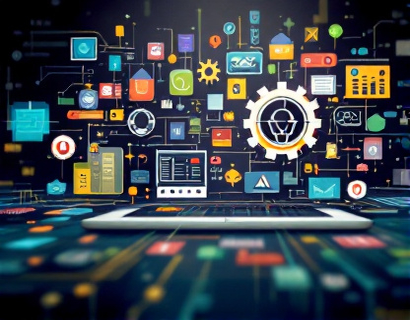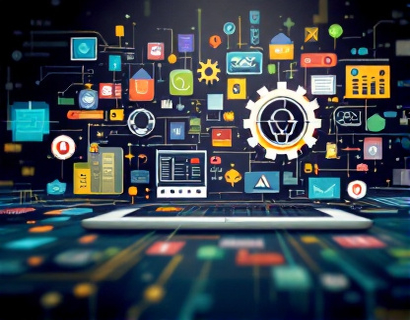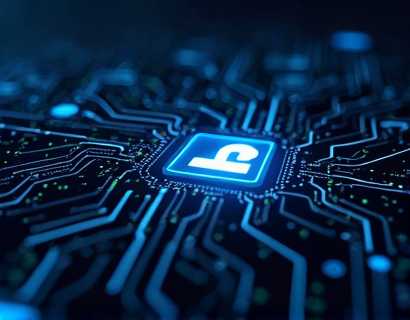Seamless AI and Blockchain Integration: An Essential Guide for Business Digital Transformation
The integration of Artificial Intelligence (AI) and blockchain technology represents a pivotal shift in the landscape of business operations and digital transformation. As companies strive to stay competitive in an increasingly digital world, understanding how to seamlessly integrate these two cutting-edge technologies is crucial. This guide serves as an essential resource for business leaders aiming to harness the full potential of AI and blockchain, offering actionable strategies to streamline operations, enhance security, and unlock new growth opportunities.
To begin, it's important to grasp the fundamental concepts of AI and blockchain. AI refers to the simulation of human intelligence processes by machines, particularly computer systems. These processes include learning (the acquisition of information and rules for using it), reasoning (using rules to reach approximate or definite conclusions), and self-correction. On the other hand, blockchain is a decentralized digital ledger technology that records transactions across multiple computers in such a way that the registered transactions cannot be altered retroactively. This technology is the backbone of cryptocurrencies like Bitcoin but has far broader applications.
Understanding the Synergy Between AI and Blockchain
The true power of integrating AI and blockchain lies in their complementary strengths. AI excels in processing and analyzing vast amounts of data to uncover patterns, make predictions, and automate decision-making processes. Blockchain, with its immutable and transparent nature, ensures the integrity and security of data transactions. When combined, these technologies can create robust systems that are not only efficient and automated but also secure and trustworthy.
One of the key areas where AI and blockchain synergize is in data management. Blockchain provides a secure and transparent way to store and share data, while AI can process this data to derive actionable insights. For instance, in supply chain management, blockchain can track the movement of goods from origin to destination, ensuring transparency and reducing fraud. AI can then analyze this data to optimize logistics, predict demand, and enhance overall supply chain efficiency.
Enhancing Security Through AI and Blockchain Integration
Security is a paramount concern for businesses, especially as they adopt digital technologies. The integration of AI and blockchain offers a multi-layered approach to security, addressing both data integrity and access control. Blockchain's inherent cryptographic features ensure that once data is recorded, it cannot be altered without consensus from the network, making it highly resistant to tampering. AI can further enhance security by detecting and responding to anomalies in real-time.
For example, AI algorithms can monitor blockchain transactions for unusual patterns that may indicate a security breach. By analyzing historical data, these algorithms can learn to identify potential threats before they materialize. Additionally, AI can automate the process of updating security protocols based on the evolving threat landscape, ensuring that the system remains robust against new types of attacks.
Streamlining Operations with AI and Blockchain
Operational efficiency is a key driver for businesses looking to integrate AI and blockchain. By automating routine tasks and ensuring data integrity, these technologies can significantly reduce operational costs and improve productivity. AI can automate complex processes such as contract management, fraud detection, and customer service, freeing up human resources for more strategic tasks. Blockchain can provide a decentralized and transparent platform for these processes, reducing the need for intermediaries and speeding up transaction times.
Consider the financial sector, where AI and blockchain can revolutionize back-office operations. AI can automate the reconciliation of transactions, reducing the risk of human error and speeding up the process. Blockchain can ensure that all transactions are recorded in a tamper-proof manner, providing a clear and auditable trail. This combination not only enhances efficiency but also builds trust among stakeholders.
Unlocking New Growth Opportunities
The integration of AI and blockchain opens up new avenues for business growth and innovation. By leveraging these technologies, companies can create new products and services that were previously impossible. For instance, in the healthcare industry, AI can analyze patient data stored on a blockchain to provide personalized treatment recommendations. This not only improves patient outcomes but also creates new revenue streams for healthcare providers.
Another area of opportunity is in the realm of smart contracts. Blockchain-based smart contracts can automate and enforce contractual obligations, reducing the need for legal interventions and lowering transaction costs. AI can enhance smart contracts by providing predictive analytics to optimize contract terms and conditions based on historical data and market trends. This can lead to more efficient and fair business agreements.
Challenges and Considerations
While the benefits of integrating AI and blockchain are significant, businesses must also be aware of the challenges and considerations involved. One of the primary challenges is the technical complexity of these technologies. Implementing a seamless integration requires a deep understanding of both AI and blockchain, as well as the ability to navigate their interdependencies. Companies may need to invest in training their workforce or partnering with experts in these fields.
Another consideration is the regulatory landscape. As AI and blockchain are relatively new technologies, regulations are still evolving. Businesses must stay informed about local and international regulations to ensure compliance. This includes data privacy laws, such as the General Data Protection Regulation (GDPR) in the EU, which have implications for how data is handled and stored on a blockchain.
Best Practices for Integration
To successfully integrate AI and blockchain, businesses should follow several best practices. First, start with a clear strategy that aligns with your business goals. Identify specific use cases where AI and blockchain can add the most value. For example, if supply chain transparency is a priority, focus on implementing blockchain for tracking and AI for analysis.
Second, invest in a skilled team or collaborate with technology partners who have expertise in both AI and blockchain. This ensures that the integration is technically sound and aligned with industry best practices. Third, prioritize data quality and security from the outset. Ensure that the data fed into the AI systems is accurate and that the blockchain network is secure to maintain the integrity of the entire system.
Fourth, adopt a gradual and iterative approach. Begin with pilot projects to test the integration and gather insights. Use these insights to refine the implementation and scale up successfully. Finally, foster a culture of continuous learning and adaptation. The fields of AI and blockchain are rapidly evolving, and staying ahead requires ongoing education and innovation.
Case Studies and Real-World Applications
Several companies have already successfully integrated AI and blockchain to drive digital transformation. One notable example is IBM, which has developed a blockchain-based platform for food safety. By using blockchain to track the journey of food from farm to store, IBM ensures transparency and traceability. AI algorithms analyze this data to identify potential contamination sources and optimize supply chain operations.
Another example is the use of AI and blockchain in the insurance industry. Companies like Lloyd's of London have explored blockchain for claims processing, reducing fraud and speeding up the claims process. AI is used to analyze claims data and detect anomalies, while blockchain ensures that all transactions are recorded securely and transparently.
Conclusion
The integration of AI and blockchain represents a transformative opportunity for businesses looking to enhance their operations, secure their data, and unlock new growth potential. By understanding the synergy between these technologies and following best practices for integration, companies can navigate the challenges and capitalize on the benefits. As the digital landscape continues to evolve, embracing AI and blockchain will be essential for staying competitive and innovative.










































